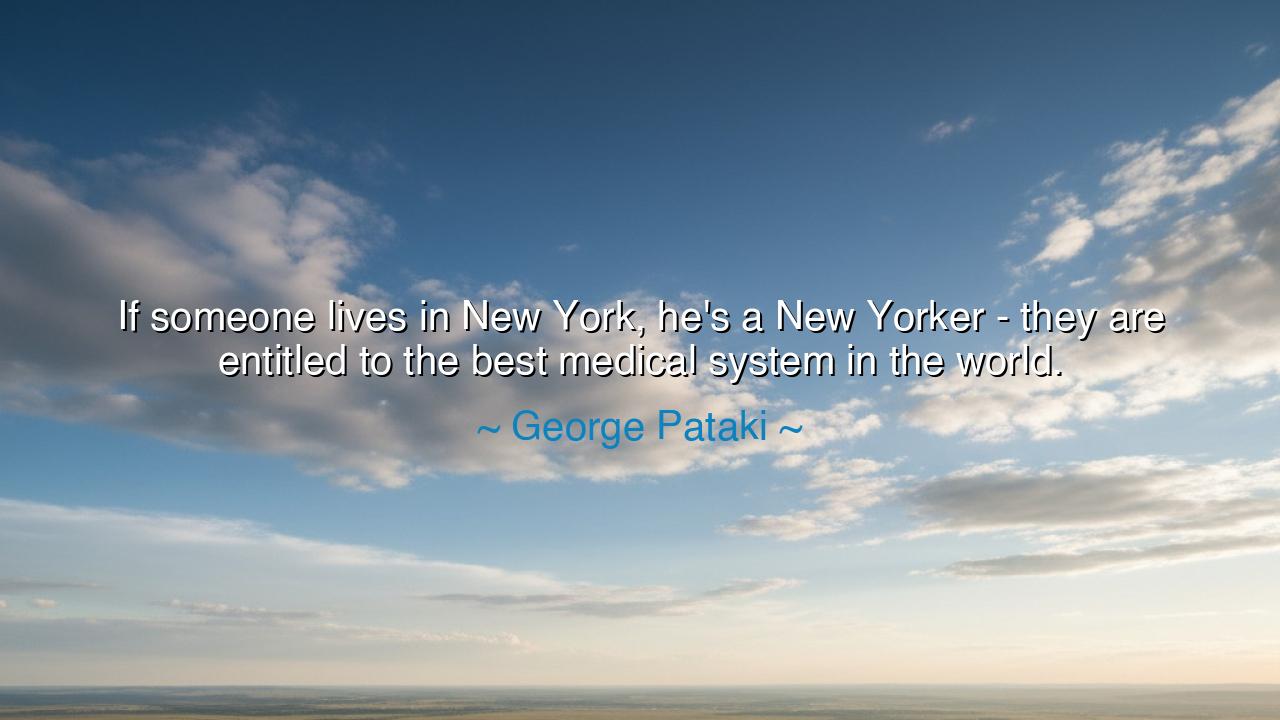
If someone lives in New York, he's a New Yorker - they are
If someone lives in New York, he's a New Yorker - they are entitled to the best medical system in the world.






In the heart of every great city lies the essence of its people, a collective spirit born of its history, its struggles, and its triumphs. George Pataki, in his assertion, "If someone lives in New York, he's a New Yorker—they are entitled to the best medical system in the world," speaks not only to the pride of belonging to a place, but to the duty of society to provide for its people. In this statement, Pataki recognizes a profound truth: that the well-being of a society is measured by how it cares for its own, and that every individual, regardless of their background, deserves the best that a community has to offer.
In the ancient world, cities like Athens were defined not just by their architecture or their grand philosophies, but by their commitment to the well-being of their citizens. Pericles, the great Athenian statesman, understood that the strength of Athens was not only in its military might or its cultural achievements but in the care it extended to its people. He spoke often of the democratic ideals that bound the citizens together, ensuring that every Athenian had the right to participate in the life of the city. In much the same way, Pataki’s words speak to the notion that in a society, those who call it home must be granted access to the resources that sustain and protect them, especially when it comes to matters of health.
In ancient Rome, the concept of civic duty was a cornerstone of society. The Roman emperors, though powerful, were expected to act in the best interests of the people. Augustus Caesar, in his reforms, created public health systems and provided for the poor, understanding that a city’s greatness was measured by how well it cared for its most vulnerable citizens. Similarly, Pataki's assertion underscores the moral responsibility of a great city like New York—a place brimming with diversity, creativity, and ambition—to offer its citizens the best medical care, ensuring that all who live there, regardless of their status or origins, are given the means to live a long and healthy life.
Consider the example of New York City itself, a beacon of hope and opportunity for countless immigrants who arrived on its shores seeking a better life. For many, New York represented the promise of belonging, where they could contribute to the fabric of the city while receiving the opportunity to flourish. In this way, Pataki’s words can be seen as a reflection of New York's identity: a place where individuals are not just residents but integral parts of the city's heartbeat. Just as the ancients believed in providing for the common good, New York is a place where every individual, from the wealthiest to the most struggling, deserves access to the best resources available.
The idea that all New Yorkers are entitled to the best medical system echoes the fundamental principle of justice that has been espoused by leaders and thinkers throughout history. Thomas Jefferson, in his writings, often spoke of the right of all citizens to life, liberty, and the pursuit of happiness—and at the core of happiness lies health. When the body suffers, the spirit falters, and no city or nation can claim true greatness without first ensuring that its people have the well-being to pursue their dreams and aspirations. Pataki’s vision aligns with this ancient principle: that a city's success is not only in its wealth but in its ability to care for the health of all its people.
The lesson here is both profound and simple: the true measure of a community’s strength lies in how it provides for its people. A great city, like New York, must not only be a place of economic opportunity and cultural richness but must also ensure that its citizens have access to the best health care, the essential foundation upon which all other achievements rest. As New Yorkers, the responsibility is not just to demand the best for ourselves but to ensure that the vulnerable, the ill, and the marginalized are not left behind. We must, like the ancients, extend our duty of care to all, for only in doing so can we truly call our society great.
Thus, let us take Pataki’s call to heart: if we live in a place of promise and opportunity, we must work to ensure that the resources we cherish are shared equally among all. In our own lives, let us strive for compassion, justice, and equity, ensuring that we never forget the moral obligation to care for the health of every member of our community. Just as ancient societies flourished by nurturing their people, so too must we build a future where health and well-being are the birthright of every individual.






AAdministratorAdministrator
Welcome, honored guests. Please leave a comment, we will respond soon